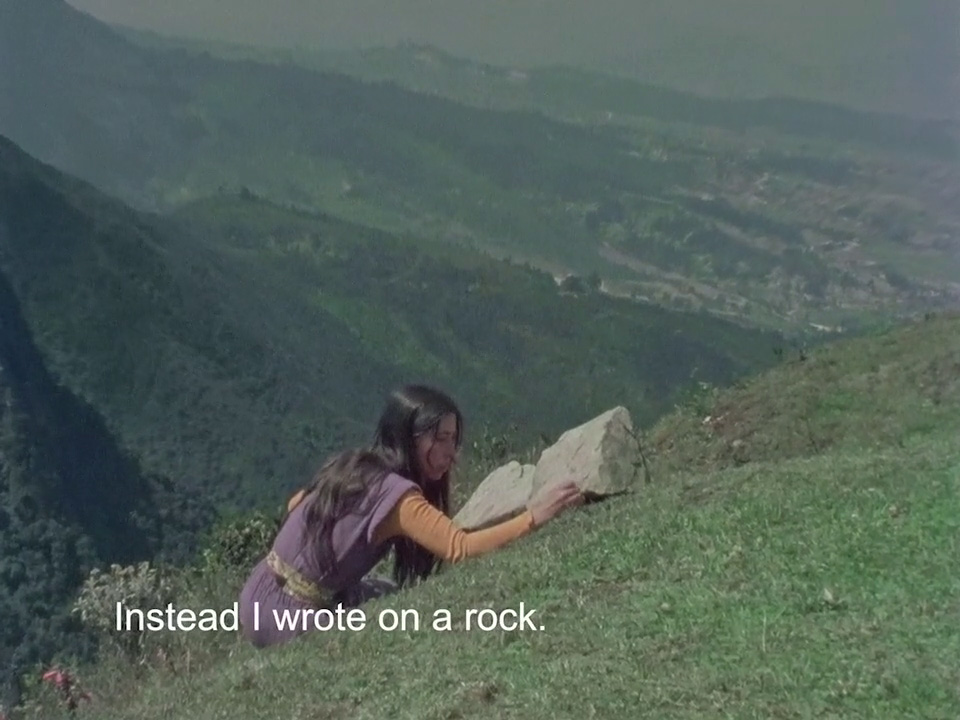Cecilia Vicuña
Cecilia Vicuña (b. 1948, Santiago, Chile) is a celebrated poet, artist, and activist. Since the mid-1960s, her revolutionary vision and genre-bending work in the fields of visual, performance, and literary arts has been at the vanguard of contemporary practice and anticipated artistic and academic movements, such as conceptual art and eco-feminist theory and practice.
In 1967, Vicuña founded Tribu No, an artist collective dedicated to the production of poetry, manifestos, and public performance actions in Santiago. Following the death of Chilean President Salvador Allende during the military coup led by Augusto Pinochet in 1973, Vicuña went into exile in London, where she was a founding member of Artists for Democracy. In 1975, she moved to Bogotá, Colombia, to conduct independent research on the cultural and artistic practice of indigenous peoples in Latin America.
Vicuña has published more than twenty-five books of poetry and art and has completed or been the subject of over eighty films since 1973. Her site-specific installations, performances, and moving image artworks have been exhibited at the Museo Nacional de Bellas Artes, Palais des Beaux Arts, Institute of Contemporary Arts (London), and other venues. She lives and works in Chile and New York.

Paracas, Cecilia Vicuña, Chile, 16 mm︎digital, 18.5 min, 1983
Cecilia Vicuña’s intriguing trajectory—from her early identification with the indigenous people of her native Chile to her current identity as an internationally respected poet and artist—is exemplary but hardly ordinary. Few artists so buffeted by a lifetime of political circumstances have found such uniquely poetic ways to respond to the winds of terror, change, and hope.
–Lucy R. Lippard
Conceived as a visual and sound poem in seven scenes, this animation of a two-thousand-year-old textile in the collection of the Brooklyn Museum invites entrance into a different visual and sonic space: the universe of the pre-Columbian weavers who created the portrait of a ritual procession using a unique three-dimensional looping technique developed in the Paracas/Nazca region. Vicuña interprets the textile as a celebration of the harvest and the Thread of Life on the desert coast of Peru.
–Electronic Arts Intermix

¿Qué es para usted la poesía?, Cecilia Vicuña, Chile, 16mm︎digital, 24 min, 1980
The poem is not speech, not in the earth, not on paper, but in the crossing and union of the three in the place that is not.
–Cecilia Vicuña
Cecilia Vicuña made her first documentary while residing in Colombia after the 1973 coup d’état in Chile. Through this fundamental inquiry, ¿Qué es para usted la poesía? (What is poetry to you?), Vicuña unravels the role and substance of poetry in people’s lives. Speaking with school children, street performers, policemen, sex workers, fellow artists, and a scientist, the all-embracing character of poetry emerges its transformative role in personal relations, as a basis of oral history and the revolutionary imagination.
–Chris Borkowski
Co-presented with Electronic Arts Intermix (EAI), New York and Three Fold. Image credits: all artworks, stills, and portraits courtesy of the artist © Cecilia Vicuña and Electronic Arts Intermix (EAI), New York. Special thanks to Karl McCool and Hannah Kay.
View next: Ximena Cuevas, as part of Media City Film Festival: Spotlight Series